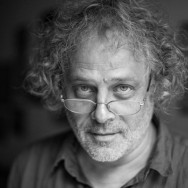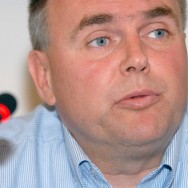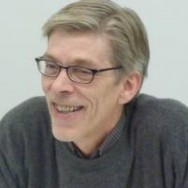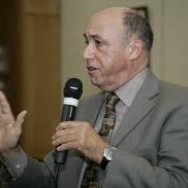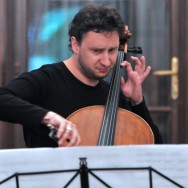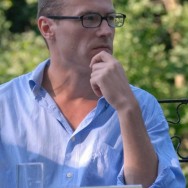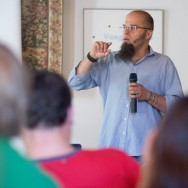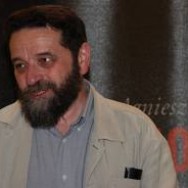Professor at the University of Theatre and Film, Budapest, author, playwright, essayist. Published three novels in Hungary, Who isn't (1999), Zehuze (2007), I was Twelve Women (2013). Besides these novels he published three essay-books about literature, theatre and film. His first play The Player, after Dostoyevski's novel was presented at the Katona József Színház, in 1985. He wrote many adaptations of classical and newer authors (Flaubert, Garcia Marquez, Hamsun, Danilo Kis), and several original plays, among them Vitellius and The Key, which won prizes and were also translated into several languages. In the last years, he directed his own play, The Boy in Oradea/Nagyvárad, (2013), and his very last play, The End is Close, was premiered (also in his own direction) in january of 2014 in Budapest in the Rózsavölgyi Szalon. He translated the plays of Kleist, Beaumarchais, Genet, Wedekind, Ödön von Horvath, Marlowe, Pinter, and many others.
Experts
Kristóf Forrai
Executive Director of the International Visegrad Fund from 2006. In 1982 graduated from the University of Economics in Budapest. In 1989 he obtained his second Master of International Affairs at Colombia University, New York, USA. He joined the Foreign Service after the collapse of the totalitarian regime as First Secretary on the Embassy of Hungary in Washington, D.C. (1990-1993). 1993 – 1997 he worked as Head of Department for the Government Office for Hungarian Minorities Abroad. In 1998 he became Head of the Department for Regional Cooperation in the Hungarian Ministry of Foreign Affairs and at the same time Hungarian representative at the Danube Commission. Before being nominated V4 National Coordinator during the Hungarian Presidency (2005-2006) he worked for four years as Ambassador at the Hungarian Embassy in Prague.
Jochen Fried
Director of education initiatives and academic director of the International Study Programme at the Salzburg Seminar. Former director of the Universities Project of the Salzburg Seminar. Since 1998 head of programs at the Institute for Human Sciences in Vienna and senior officer in the secretariat of the German Science Council in Cologne, Germany. After receiving the PhD degree in German literature from the Düsseldorf University, in 1984, he was lecturer at the Cambridge University, and at the University of Ljubljana, under the auspices of the German Academic Exchange Service. Main area of professional interests are higher education and research policy. Expert for the Austrian Federal Ministry for Education, Science and Culture, member of the editorial board of the UNESCO-CEPES quarterly review Higher Education in Europe.
Ivor Gaber
Director of City's Political Journalism MA of London University has an outstanding background in both practical political journalism and in academic research in this area. He has co-authored three books and numerous articles on political communications, and has served as a media consultant to a variety of organisations, governments and international bodies. His journalistic career has included senior editorial positions at the BBC, ITN, Channel Four and Sky News. He is an Independent Editorial Adviser to the BBC and a frequent contributor to radio and television networks in the UK and abroad.
Andrej Gál
Graduated from VŠMU Bratislava. He participated in several international courses and competitions (e.g. under R. Wallfisch). Since 1999 Andrej Gál has performed several times the first cello in the Internationale Orchesterakademie in Germany and also within the festival orchestra at Summer Arts in Idyllwild in California. Since 2001 he has been a member of the Bohdan Warchal Slovak Chamber Music Orchestra and the Zwiebel Quartet. Andrej Gál performs chamber music and interprets contemporary Slovak and international music.
Zoltán Gál
MA in Central European Studies at the Central European University, Budapest in 1994. PhD in Economic Geography at the Hungarian Academy of Sciences in 1998. Research fields include Regional Economics, Regional Economics of Finance, Financial Geography, Regional Innovation Policy, Innovation Systems, Co-operation in the Central Europe in the field of innovation, Financial Sector Development in the Eastern and Central Europe and Economic History. Senior research fellow at the Centre for Regional Studies, HAS, the Transdanubian Research Institute, and Associate Professor at the University of Kaposvár, Faculty of Economics, Department of Regional Economics.2003-2004expert at the Regional Foresight Unit at the DG Research of the European Commission, Brussels. 2001-2004 senior manager of the Regional Innovation Strategy for the South Transdanuabian region.
Marcin Galent
Sociologist and anthropologist; PhD from the Centre for European Studies of the Jagiellonian University, focused on immigration within the EU. He has taken part in a number of research projects focusing on the attitudes of the Poles towards European integration. His current interests include the reconstruction of national identity, citizenship, and the theory of multiculturalism. 1999 – 2000 He was assistant in Joint European Project done with European Commision, Philosophy Faculty on Jagiellonian University, UAM in Poznań, UMCS in Lublin, University of Granada (Spain) and University of Exeter (England). In 2004 he was a Member of University Association for Contemporary European Studies, UK. In 2002 – Mamber – founder of European Forum Association. In 2001 – Member of the Academy of Political Science in New York.
Remigiusz Gawlik
Associated Professor at the International Economics Department of Cracow University of Economics. Scientific interests: international economic and political relations, geopolitics, mathematical aided decision ‑ making, science marketing and adventure tourism. Business consultant in the fields of strategic and multicultural management, psychological factors in management and geopolitical functioning of international enterprises. Besides scientific and didactical activity he has acquired experience in international enterprises (i.e. ISP Modzelewski i Wspólnicy Sp. z o.o., Compact S.A., Electricité de France). NGO associate (i.e. Villa Decius), consultant in European Union’s Framework Programmes (various tasks in frames of Operational Programme Human Capital), guest lecturer at foreign Universities (Germany, Netherlands, Turkey, USA). Alumnus of Cracow University of Economics (International Relations, International Management). Scholar of Polish Government at the College of Europe, Natolin / Brugge (Poland / Belgium, European Interdisciplinary Studies) and Hanns – Seidel – Stiftung at the Georg – Simon – Ohm Fachhochschule Nürnberg (Germany, Betriebswirtschaft). Hobbies: adventure tourism, construction of motorcycles, lead guitarist in doom – metal band Lacrima.

